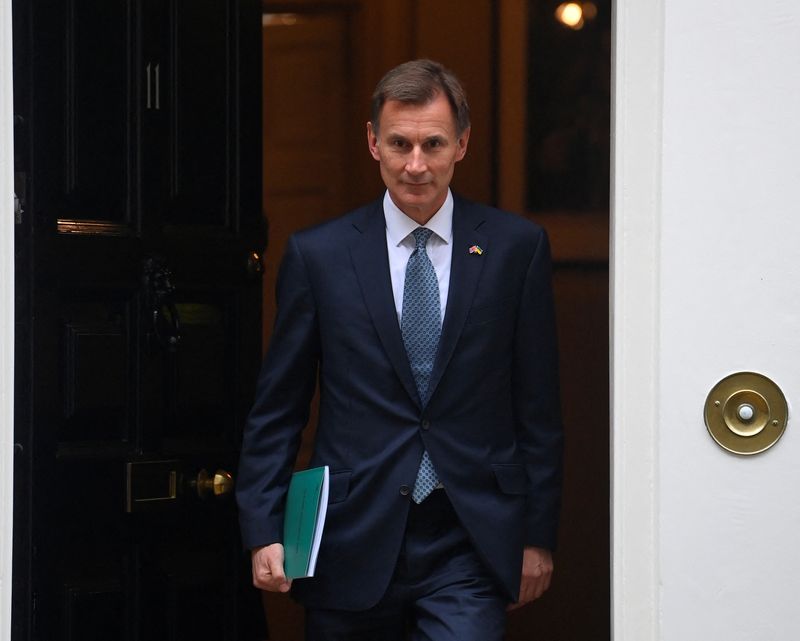By David Milliken, Kylie MacLellan and Andy Bruce
LONDON (Reuters) - Finance minister Jeremy Hunt sought on Wednesday to revitalise Britain's stagnating economy with a mix of childcare and pension reforms to tempt people back to work, as well as corporate tax breaks to boost weak business investment.
Saying the world's sixth-biggest economy was now set to avoid a recession this year - even if it will still contract - Hunt extended help for households hit hard by soaring energy bills and froze a tax on vehicle fuel.
"In the face of enormous challenges, I report today on a British economy which is proving the doubters wrong," Hunt said, to jeers from the opposition Labour Party which is riding high in opinion polls ahead of an election expected next year.
"In the autumn we took difficult decisions to deliver stability and sound money," said Hunt, who was rushed into the Treasury last October to undo the plans for tax cuts that sowed chaos in financial markets during Liz Truss's brief premiership.
"The International Monetary Fund says our approach means the UK economy is on the right track."
Labour leader Keir Starmer accused Hunt of "dressing up stagnation as stability" and said Britain "is on a path of managed decline."
After the shocks of Brexit, a heavy COVID-19 hit and double-digit inflation, Britain's is the only Group of Seven economy yet to recover its pre-pandemic size, having previously suffered a decade of near-stagnant income growth.
Hunt and Prime Minister Rishi Sunak resisted calls from some lawmakers in their Conservative Party for big tax cuts now to ease the heaviest tax burden on the economy since World War Two.
But they found money to extend household energy subsidies by three months and freeze fuel duty for another year.
Despite that help, and lower inflation than previously expected, living standards remain on track for a record fall over the two years to the end of March 2024.
In a bid to speed up growth, Hunt expanded free childcare to children under two in England as a way to get more parents of young children into work. Campaigners said the 4 billion pounds ($4.8 billion) of annual funding would not meet demand.
Other measures to boost the size of the workforce included the end of penalties for people breaking thresholds on pension contributions, an attempt to keep more older people in their jobs, and welfare changes to encourage disabled people to work.
Independent forecasters at the Office for Budget Responsibility (OBR) said it was hard to judge the impact of Hunt's attempts to get more workers into the jobs market and it warned that the share of people in work or looking for it was set to hit a 23-year low next year before rising.
Hunt also announced a new three-year incentive for business investment that will allow companies to offset 100% of their capital expenditure against profits, although that represented a scaling-back of tax breaks under a previous scheme.
The OBR said the change would not cushion all the pain for companies, as a leap in the corporation tax rate next month will represent the heaviest burden on businesses since the levy was introduced in 1965.
Paul Johnson, director of the non-partisan Institute for Fiscal Studies, said the incentives would cause more volatility for businesses.
"Today's announcement is just the latest in a long line of changes and temporary tweaks," Johnson said. "There's no stability, no certainty, and no sense of a wider plan."
Other budget measures included more investment in nuclear power and a new training programme for workers aged over 50.
Hunt said the government would add 11 billion pounds to the defence budget - which has been stretched by Britain's support for Ukraine in its war with Russia - over the next five years.
RECESSION AVOIDED, JUST
A new set of economic forecasts showed gross domestic product was set to shrink by 0.2% in 2023 rather than contract by 1.4% as projected by the OBR in November.
GRAPHIC-UK budget deficit
https://www.reuters.com/graphics/BRITAIN-BUDGET/znvnbleeovl/chart.png
GRAPHIC-Real GDP growth projections
https://www.reuters.com/graphics/BRITAIN-BUDGET/zjpqjnkkyvx/chart.png
Since then, energy costs - which soared after Russia's invasion of Ukraine - have come down and there have been signs of a recovery in some economic data.
"Today the Office for Budget Responsibility forecast that because of changing international factors and the measures I take, the UK will not now enter a technical recession this year," Hunt said.
The OBR forecast economic output would grow by 1.8% in 2024 and by 2.5% in 2025, he said, compared with its previous forecasts for growth of 1.3% and 2.6% respectively.
It cut its forecast for inflation this year to 6.1% from 7.4% in November - and said it would remain under 1% for the following three years.
Many economists have said Hunt probably wants to hold back some fiscal firepower for closer to the next national election.
But Wednesday's forecasts showed the limits going forward.
Hunt's target to get Britain's public debt - currently standing at about 2.5 trillion pounds - falling as a share of GDP in five years' time was on course to be met with a buffer of just 6.5 billion pounds.

The OBR said that was the narrowest margin for any finance minister since George Osborne set up the fiscal watchdog in 2010.
($1 = 0.8304 pounds)
